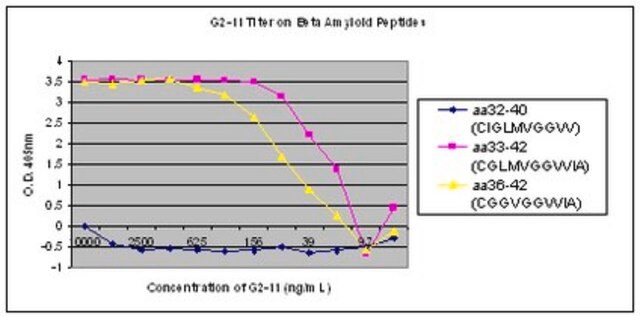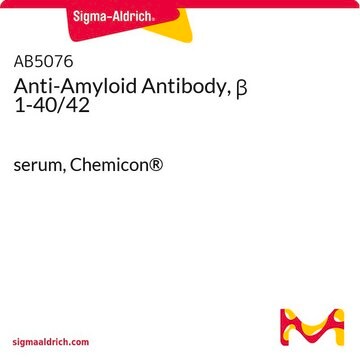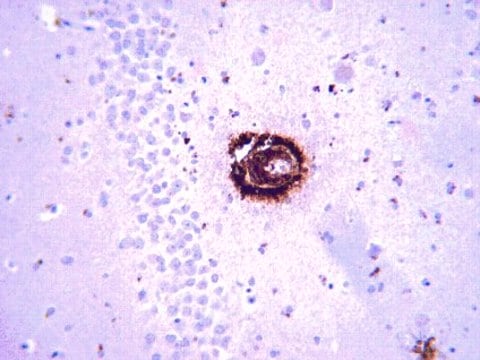MABN13
Anti-Amyloid β42 Antibody, clone G2-13
clone G2-13, from mouse
Sinónimos:
Alzheimer disease, Alzheimer disease amyloid protein, Cerebral vascular amyloid peptide, Protease nexin-II, amyloid beta (A4) precursor protein, amyloid beta A4 protein, amyloid beta precursor protein, beta-amyloid peptide, human mRNA for amyloid A4 prec
About This Item
Productos recomendados
biological source
mouse
Quality Level
antibody form
purified antibody
clone
G2-13, monoclonal
species reactivity
human
species reactivity (predicted by homology)
mouse (based on 100% sequence homology)
technique(s)
ELISA: suitable
immunohistochemistry: suitable
western blot: suitable
isotype
IgG1κ
NCBI accession no.
UniProt accession no.
shipped in
wet ice
target post-translational modification
unmodified
Gene Information
human ... APP(351)
General description
Specificity
Immunogen
Application
ELISA: A representative lot of MABN12 antibody was used in a titer ELISA. Specificity of detection for Amyloid beta peptides is displayed below.
ELISA:
Neuroscience
Neurodegenerative Diseases
Quality
Western Blot Analysis: 1 µg/ml of this antibody detected Amyloid β42 in 10 µg of human Alzheimer diseased brain tissue lysate.
Target description
Physical form
Storage and Stability
Analysis Note
Human Alzheimer diseased brain tissue lysate
Other Notes
Disclaimer
Storage Class
12 - Non Combustible Liquids
wgk_germany
WGK 2
flash_point_f
Not applicable
flash_point_c
Not applicable
Certificados de análisis (COA)
Busque Certificados de análisis (COA) introduciendo el número de lote del producto. Los números de lote se encuentran en la etiqueta del producto después de las palabras «Lot» o «Batch»
¿Ya tiene este producto?
Encuentre la documentación para los productos que ha comprado recientemente en la Biblioteca de documentos.
Nuestro equipo de científicos tiene experiencia en todas las áreas de investigación: Ciencias de la vida, Ciencia de los materiales, Síntesis química, Cromatografía, Analítica y muchas otras.
Póngase en contacto con el Servicio técnico








